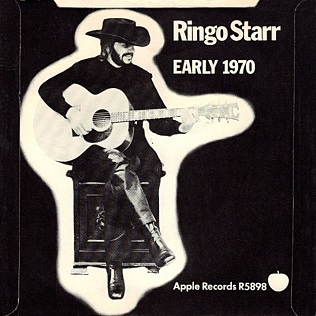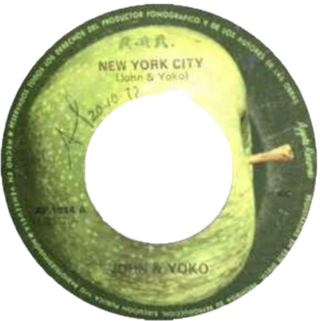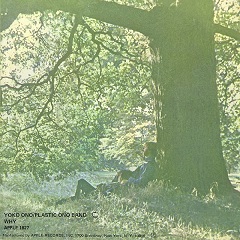
"Instant Karma!" is a song by English rock musician John Lennon, released as a single on Apple Records in February 1970. The lyrics focus on a concept in which the consequences of one's actions are immediate rather than borne out over a lifetime. The single was credited to "Lennon/Ono with the Plastic Ono Band", apart from in the US, where the credit was "John Ono Lennon". The song reached the top five in the British and American charts, competing with the Beatles' "Let It Be" in the US, where it became the first solo single by a member of the band to sell a million copies.
"I'm the Greatest" is a song written by English musician John Lennon that was released as the opening track of the 1973 album Ringo by Ringo Starr. With Starr, Lennon and George Harrison appearing on the track, it marks the only time that three former Beatles recorded together between the band's break-up in 1970 and Lennon's death in 1980. Lennon wrote the song in December 1970 as a wry comment on his rise to fame, and later tailored the lyrics for Starr to sing. Named after one of Muhammad Ali's catchphrases, the song partly evokes the stage-show concept of the Beatles' 1967 album Sgt. Pepper's Lonely Hearts Club Band.
"Surprise, Surprise " is a song written by John Lennon that was first released on his 1974 album Walls and Bridges. Elton John contributes harmony vocals to the song.

"Isolation" is a 1970 song appearing on John Lennon's first official solo album release, John Lennon/Plastic Ono Band. It ends side one of the album, and is the fifth track. In the Philippines, Apple Records released "Isolation" as the B-side to "Mother", the single off John Lennon/Plastic Ono Band, in contrast to most countries where the B-side was Yoko Ono's "Why". It was also released on an EP in Mexico along with "Mother", "Look at Me" and "My Mummy's Dead".
"Hold On" is a song from the album John Lennon/Plastic Ono Band by John Lennon. It features only vocals, tremolo guitar, drums, and bass guitar, typical of the sparse arrangements Lennon favoured at the time. On the 2000 reissue of John Lennon/Plastic Ono Band, "Hold On" features a slightly longer introduction. The original version was restored on the 2010 reissue.
"Well Well Well" is a song by the English musician John Lennon from his 1970 album John Lennon/Plastic Ono Band. The eighth and longest track on the album, "Well Well Well" features an aggressive guitar sound, screaming vocals and a pounding backing track.

"Early 1970" is a song by the English rock musician Ringo Starr that was released as the B-side of his April 1971 single "It Don't Come Easy". A rare example of Starr's songwriting at the time, it was inspired by the break-up of the Beatles and documents his relationship with his three former bandmates. The lyrics to the verses comment in turn on Paul McCartney, John Lennon and George Harrison as individuals, and the likelihood of each of them making music with Starr again. In the final verse, Starr offers a self-deprecating picture of his musical abilities and expresses the hope that all four will play together in the future. Commentators have variously described "Early 1970" as "a rough draft of a peace treaty" and "a disarming open letter" from Starr to Lennon, McCartney and Harrison.

"My Mummy's Dead" is the closing song on the album John Lennon/Plastic Ono Band by John Lennon. The song was also released on a Mexican EP that also contained "Mother", "Isolation" and "Look at Me".

"Sisters, O Sisters", also known as "Sisters O Sisters", is a song written by Yoko Ono that first appeared on John Lennon's and Yoko Ono's 1972 Plastic Ono Band album Some Time in New York City, backed by Elephant's Memory. It was also released as the b-side to the couple's "Woman Is the Nigger of the World" single. It has been covered by a number of artists, including Le Tigre and Tater Totz.

"New York City" is a song written by John Lennon that was first released on Lennon's and Yoko Ono's 1972 Plastic Ono Band album Some Time in New York City.
"We're All Water" is a song written by Yoko Ono that was first released on the 1972 John Lennon and Yoko Ono Plastic Ono Band album Some Time in New York City. It was the last song on the first record of the album, and the last song on the album that was recorded in the studio.

"What You Got" is a song written by John Lennon that was first released on his 1974 album Walls and Bridges. It was later released as the B-side to his top 10 "#9 Dream" single.
"Scared" is a song written by John Lennon that was first released on his 1974 album Walls and Bridges. Alternate versions were subsequently released on the compilation albums Menlove Ave. and John Lennon Anthology.

"Why" is a song written by Yoko Ono that was first released on her 1970 Yoko Ono/Plastic Ono Band album. In the U.S. it was also released as the B-side of John Lennon's "Mother" single, taken from his John Lennon/Plastic Ono Band album.

"Touch Me" is a song written by Yoko Ono that was first released on her 1970 album Yoko Ono/Plastic Ono Band. An edited version was later released in the U.S. as the b-side to John Lennon's single "Power to the People."

"Remember Love" is a song written by Yoko Ono and initially released as the B-side of John Lennon's and Ono's 1969 single "Give Peace a Chance."

"Who Has Seen the Wind?" is a song written by Yoko Ono that first appeared as the B-side of John Lennon's single "Instant Karma!" It was later issued as a bonus track on a compact disc version of the Wedding Album.

"Move Over Ms. L" is a song written by John Lennon. It was originally intended to be released on his 1974 album Walls and Bridges but was left off shortly before the album release, and was eventually released as the b-side to Lennon's "Stand by Me" single. In the interim it was released by Keith Moon on his album Two Sides of the Moon. Moon also released it as the B-side of his "Solid Gold" single.
"Sunday Bloody Sunday" is a song written by John Lennon and Yoko Ono that was first released on their 1972 Plastic Ono Band album with Elephant's Memory, Some Time in New York City. The song addresses the Bloody Sunday massacre of 1972 and is one of two on the album that addresses the contemporary Northern Ireland conflict, "The Luck of the Irish" being the other.

"Beef Jerky" is an instrumental written by John Lennon that was released on his 1974 album Walls and Bridges and also as the b-side of the lead single from that album, the #1 hit "Whatever Gets You thru the Night."













